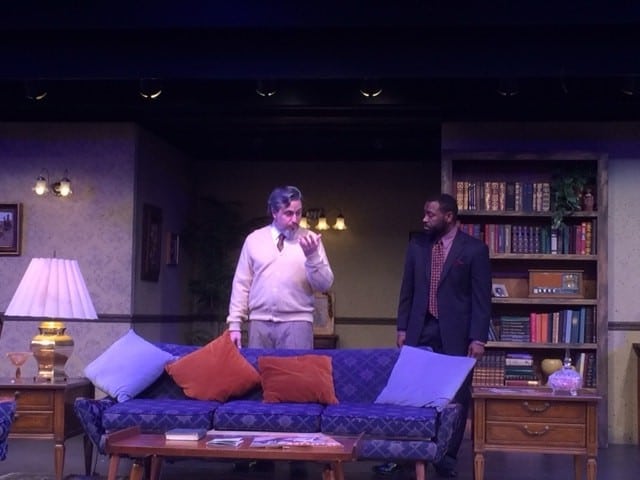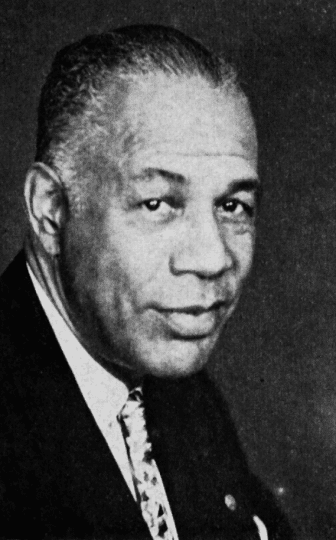The Green Book and the Black-Jewish Relationship During Segregation
The Green Book has been described as “the Bible for black travelers in the mid-20th century.” It featured black-friendly businesses like motels and restaurants where travelers could rest on long road trips. The book’s publisher actually took the idea from a similar book used by Jews. A play titled The Green Book, which opens tonight in Birmingham, highlights the relationship between the black and Jewish communities during segregation.
In Calvin Ramsey’s play, we meet Jacob, a Holocaust survivor, and Keith, a black traveling salesman who sells the Green Book. Both are guests at the home of a black family in Missouri. The play is set during the days of Jim Crow when travel wasn’t safe for people of color or religious minorities.
Jacob tells Keith how he befriended a black soldier in WWII who helped him escape death in a concentration camp. This friendship led Jacob to the Green Book, which he uses on his trip. Playwright Calvin Ramsey is often asked why the protagonist in his play is Jewish and not black like him. He says he wanted to highlight the history these two communities share.
“You know, in the 50s in the late 40s, the Jewish community and the black community really worked closely together to overturn a lot of the unfairness before the civil rights acts were passed,” Ramsey says.
“It’s a shared experience of slavery, a shared experience of prejudice,” says Alvin Sugarman, Rabbi Emeritus at The Temple in Atlanta.
Blacks and Jews were targets for violence in the South in the early to mid-20th century. In Birmingham, years before the bombing of the 16th Street Baptist Church, a bomb was discovered at Temple Beth-El. That bomb was disarmed. According to police accounts, the bomb at Temple Beth-El would’ve been more destructive than the 16th Street bomb and would’ve completely destroyed the building.
But Sugarman says struggle wasn’t the only thing uniting these groups. There was also a mutual faith in God and a demand for equality.
“And of course the great Hebrew prophets who cried out for, ‘Justice! Justice! Thou shalt pursue justice!’ That whole prophetic cry for social justice,” he says.
According to the Jewish Virtual Library, the relationship between Jews and blacks strengthened during World War II. Jews fleeing persecution in Europe and ones fighting anti-Semitism in America joined forces with the African-American community in the fight against racism and bigotry. The groups often lived alongside each other in cities. Jews owned several businesses in black neighborhoods, something Ramsey remembers very well.
“[The] first nine years of my life I was in Baltimore,” he remembers. “And I lived in a neighborhood where pretty much all the merchants on each corner were Jewish. And my mom would send me to the store. They were always nice. They always made me feel good, always put something extra in the bag for my mom or something like that.”
Ramsey says his play is an homage to the Jewish merchants that had such a positive effect on his childhood. But more than anything, Ramsey says, his play honors Victor Green’s memory and the motorist hand guide that made him famous.
“This is somebody, honestly, that every person – especially every black person – should be learning about in school because he was such a big part of people who grew up in the early 20th century’s life. Like, you had a Green Book in your car,” says Ahmad Ward, vice president of education and exhibitions at the Birmingham Civil Rights Institute.
The Green Book is indicative of what African-Americans had to do to lead normal lives during segregation, Ward says. But what most don’t know is that the idea for the Green Book was actually borrowed from a similar book used by Jews in the early 20th century, outlining another important intersection between these two communities.
The New York Public Library has digitized several copies of the Negro Motorist Green Book. Click here for more.
Alabama man, on death row since 1990, to get new trial
The U.S. Supreme Court on Monday declined to review the summer ruling from the 11th U.S. Circuit Court of Appeals. The decision paves the way for Michael Sockwell to receive a new trial.
Supreme Court blocks redrawing of New York congressional map, dealing a win for GOP
At issue is the mid-term redrawing of New York's 11th congressional district, including Staten Island and a small part of Brooklyn.
Video of Clinton depositions in Epstein investigation released by House Republicans
Over hours of testimony, the Clintons both denied knowledge of Epstein's crimes prior to his pleading guilty in 2008 to state charges in Florida for soliciting prostitution from an underage girl.
Some Middle East flights resume, but thousands of travelers are still stranded by war
Limited flights out of the Middle East resumed on Monday. But hundreds of thousands of travelers are still stranded in the region after attacks on Iran by the U.S. and Israel.
‘Hamnet’ star Jessie Buckley looks for the ‘shadowy bits’ of her characters
Buckley has been nominated for a best actress Oscar for her portrayal of William Shakespeare's wife in Hamnet. The film "brought me into this next chapter of my life as a mother," Buckley says.
How, who, and why: NPR flips its famous letters to defend the right to be curious
NPR is standing up for the public's right to ask hard questions in a national campaign dubbed "For your right to be curious." At NPR's headquarters, on billboards in New York City, Chicago, and Washington, D.C., and across social media, NPR's three iconic letters transform into "how," "who," and "why" — a bold declaration of its commitment to fight for Americans' right to ask questions both big and small.








